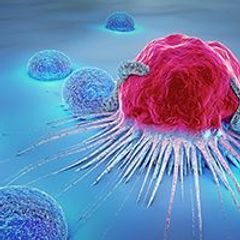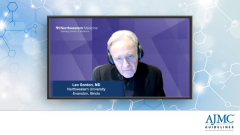
Additional Treatment Strategies and Collaborative Care for Patients with DLBCL
The impact of collaborative care in DLBCL treatment is explored by a medical expert.
Episodes in this series

Leo Gordon, MD: Patients who have mutations of the C-myc gene and the BCL2 gene do worse. We had done a retrospective study looking at different regimens. We, as a standard at our institution, have been using EPOCH [etoposide, prednisone, vincristine, cyclophosphamide, and doxorubicin] in those patients and because they have a higher likelihood of central nervous system disease later. We have tended to use prophylactic intrathecal therapy (although that’s controversial) in those patients. There are now some studies with published data on CAR T [chimeric antigen receptor T-cell therapy] [being used] sort of not quite up front, but maybe after 1 cycle of a more standard regimen, to look at the value of CAR T therapy earlier in very high-risk group of patients. I would say that one of the highest-risk groups of patients with DLBCL [diffuse large B-cell lymphoma] is an LDH level over 3 times normal. Patients who come in with an LDH level over 3 times the normal range have an outcome that’s similar to pancreatic cancer. When you look at the mean, look at the data. So I would say double-hit [lymphoma] and LDH greater than 3 times normal are very strong negative predictive factors. For those patients I would look for novel treatments and clinical trials and hopefully we’ll bring forward some of the things we’re doing in [the] third and fourth lines to [the] first line in that group of patients.
Pharmacists are a major part of our day-to-day activities, initially on the inpatient service where they’re invaluable and then on the outpatient service. All of our lymphoma clinics and all of our hematologic-malignant clinics—lymphoma, leukemia, myeloma, and transplant—all have pharmacists embedded in the clinic and giving us advice as well as counseling patients who are about to start a new treatment. It really brings a much higher level of care than it has been. I would encourage anybody who is practicing oncology to include a pharmacist. We’re dealing with drugs, and pharmacists have a very good understanding of these drugs and have the ability to explain and talk to patients better than probably I do. They also help train our nurses.
Where we haven’t done anything is with payers. I would love to have payers involved in some of the decisions before they turn down a treatment that we’re recommending, but I don’t know how you do that. I’m not sure you can embed payers into the day-to-day practice, but I think that would be great if we could do it and they could get a sense of what goes on with some of the recommendations. Just to give you an example, we have somebody on maintenance reduction after mantle cell lymphoma, which is an approved treatment…. We’re getting pushback from the insurer not about the value of the reduction, but that we haven’t done a CT scan every 3 months because that’s what they say we would have to do in order to continue approving the Rituxan. They’re asking for four $10,000 to $20,000 tests a year that aren’t necessary in order to approve the Rituxan. I think there are some illogical things like that which we deal with every day from payers in general. They do a great job. I think they are sensitive to these things, but I think once in a while they get stuck in check boxes and things of that sort. I think they can understand a little better if perhaps they were at the bedside. If you can tell us a great way to do that, then I would love to have payers involved.
Transcript is AI-generated and edited for clarity and readability.
Newsletter
Stay ahead of policy, cost, and value—subscribe to AJMC for expert insights at the intersection of clinical care and health economics.











